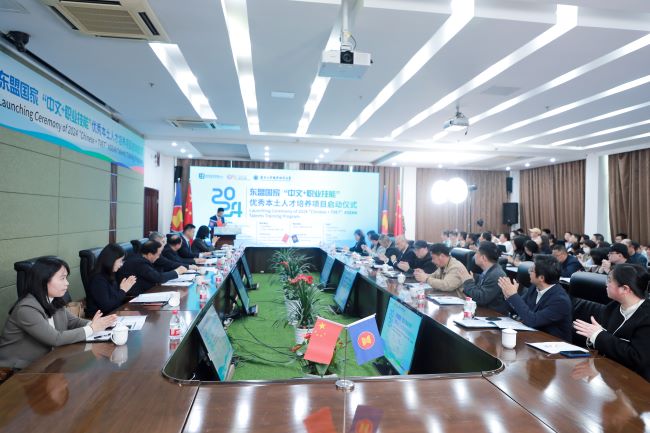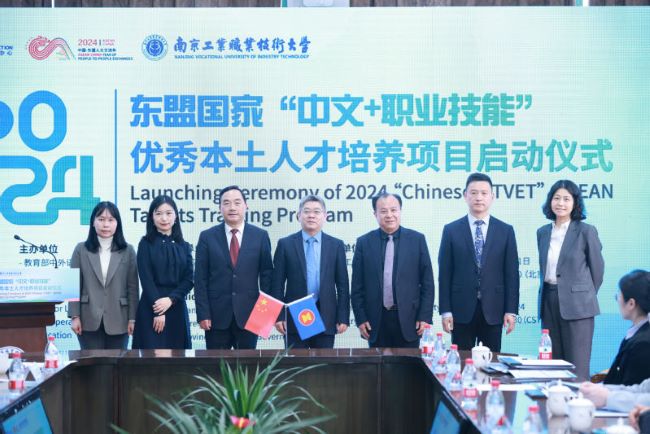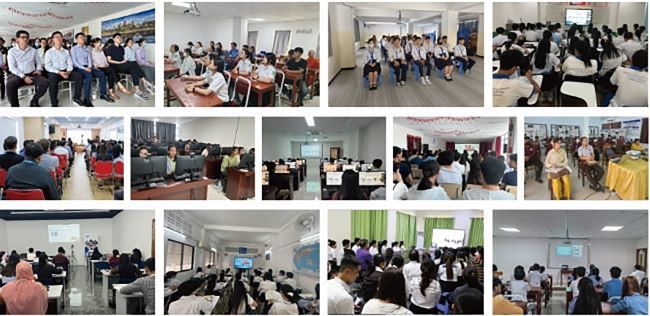On April 1, under the guidance of the Centre for Sino-Foreign Language Exchange and Cooperation of the Ministry of Education, the Department of Education of Jiangsu Province, and the Foreign Affairs Office of Jiangsu Provincial People's Government, the University held the launching ceremony of the 2024 ASEAN Excellent Native Talent Cultivation Project of Chinese Language + Vocational Skills. As one of the series of activities of Jiangsu Province to participate in the Year of China-ASEAN Humanities Exchange, this event aims to further strengthen the educational cooperation between China and ASEAN countries and promote the high-quality development of "Chinese + Vocational Skills" education. Hu Zhiping, deputy director of the Language Cooperation Centre of the Ministry of Education, Wang Huichang, director of the Asia-Africa Division, Zhou Jiuhua, second grade inspector of the Jiangsu Provincial Department of Education, Li Qinguang, fourth grade researcher of the Foreign Cooperation and Exchange Division, Jin Shangjun, deputy director of the Foreign Affairs Office of the Jiangsu Provincial People's Government, Wang Wenhui, deputy director of the Asia-Europe Division, and the representatives of the Embassies and Consulates of ASEAN countries, such as Cambodia, were present at the event. 1254 teachers' representatives from ten ASEAN countries including Cambodia, Malaysia, Thailand, Brunei, etc., and teachers' representatives from 41 vocational colleges and universities in China attended the meeting. Wu Xuemin, Secretary of the Party Committee of the University, Xie Yonghua, Deputy Secretary of the Party Committee and President of the University, attended the event, and Sun Yanfei, member of the Standing Committee of the Party Committee and Vice President of the University, presided over the event.
Hu Zhiping congratulated on the success of this event. He pointed out that in recent years, the demand of people in ASEAN countries for learning Chinese and understanding China has been increasing, especially with a large number of "Belt and Road" key projects that are grounded and beneficial to people's livelihoods steadily advancing in ASEAN countries, it has become a popular choice for many young people to learn Chinese, master skills and broaden career development channels. As an educational institution supporting Sino-foreign language exchange and cooperation, the Centre is willing to promote the development of international Chinese language education, and at the same time, through the "Chinese Language + Vocational Skills" project, cooperate with domestic vocational and technical colleges and universities, and cooperate with foreign countries to carry out "Chinese Language + Vocational Skills" training, in order to train local people who are proficient in Chinese language and have good skills. At the same time, through the "Chinese + Vocational Skills" programme, we cooperate with domestic vocational colleges and universities and conduct "Chinese + Vocational Skills" training in cooperation with foreign countries, so as to cultivate composite talents who are proficient in Chinese language and skills for the local communities. We hope that this training can help teachers of vocational colleges in ASEAN countries to improve their Chinese language skills, enhance their teaching ability of "Chinese language + vocational skills", expand their career development channels, and further enhance the comprehensive quality and employability of students in vocational colleges.
Zhou Jiu-hua said Jiangsu is a large economic province, is China's fastest growing economy, the highest degree of openness, the development of one of the most dynamic areas. Jiangsu with 1% of the country's land, supporting 6% of the country's population, creating more than 10% of the country's GDP. jiangsu is a large province of education, the existing 15,700 schools of various types, more than 16 million students. Among them, there are 169 colleges and universities, ranking the first in the country, and the number of "double first-class" construction colleges and universities ranks the second in the country. There are 202 Chinese-foreign cooperative educational institutions and projects in the province, including 24 Chinese-foreign cooperative educational institutions at undergraduate level and above, ranking the first in the country. 29,000 foreign students from 178 countries are studying in Jiangsu in 2023, including 6,623 ASEAN students, and 17 colleges and universities are hosting 27 Confucius Institutes overseas. For this training, Zhou Jiuhua put forward three expectations: firstly, seize the opportunity and cherish the chance; secondly, exchange and mutual understanding, build and share; thirdly, deepen the friendship and be a good messenger.
Jin Shangjun pointed out that since 2013, when President Xi Jinping proposed the construction of a closer China-ASEAN community of destiny, China and ASEAN have joined hands and made mutual achievements, the comprehensive strategic partnership has become increasingly close, the joint construction of the "One Belt and One Road" has achieved significant results, and the concept of "pro-integrity" has taken root in people's hearts, which has contributed to the peace, stability and prosperity of the region. Together, they have made important contributions to regional peace, stability and prosperity. As an economic, cultural and open province in China, Jiangsu has in recent years grasped the historical opportunity of the great development of China's ASEAN relations, and actively written a new story of friendly exchanges and economic exchanges between the two sides. Firstly, economic and trade cooperation has been solidly promoted, walking in the forefront of the country; secondly, humanistic exchanges have been active and colourful, walking in the forefront of the region; and thirdly, integration and development have become increasingly close, walking in the forefront of the times. Provincial Foreign Affairs Office will actively play a foreign affairs resource advantage to set up channels and platforms for Jiangsu and ASEAN countries to carry out exchanges and co-operation in various fields at all levels to provide assistance and good service.
Wu Xuemin pointed out that at present China's vocational education is ushering in a new opportunity for development, vigorously develop "Chinese + vocational skills" education, to serve the economic and social development of ASEAN, is an important practice of China's education concept of opening up to the outside world, is to promote the integration of the development of international Chinese language education and vocational education, is to promote the people's hearts and minds of each other an important driving force. It is an important measure to promote the integration and development of international Chinese education and vocational education, and an important driving force to promote people-to-people communication. Our university will deepen the educational cooperation with ASEAN, continue to promote the construction of Chinese vocational education "going out" brand, and promote the high-quality development of "Chinese + vocational skills". Firstly, we will build and share high-quality resources; secondly, we will deepen the integration and development of schools and enterprises; thirdly, we will empower the students' employment development. It is hoped that the participating teachers will take this training programme as an opportunity to enhance their understanding and trust, to have deeper cooperation and broader exchanges in the future, to achieve more and higher quality results, to create a new situation of exchange and cooperation in "Chinese + Vocational Skills" education, and to write a new chapter together.
Xie Yonghua gave a keynote speech entitled "Overview of the Development of Vocational Education in China", in which he elaborated on the current development of vocational education in China from four aspects: the basic situation of vocational education in China, the development of vocational education in China in the past ten years, the achievements and experiences of the construction of vocational education in China, as well as the exploration and practice of vocational education of our university. Xie Yonghua also introduced the international cooperation and exchange of our university. He said that relying on the first "Chinese + vocational skills" international promotion base in China, our university actively explores new modes, methods and ideas of "vocational education abroad", and has made great progress in teacher training, teaching resources development, "Chinese + vocational skills" overseas education. We have achieved remarkable results in teacher training, teaching resources development, "Chinese + Vocational Skills" overseas schooling and other aspects. In the future, the university will continue to strengthen vocational education exchanges with ASEAN countries, further promote the high-quality development of "Chinese + Vocational Skills", and make greater contributions to promoting humanistic exchanges and people-to-people communication between China and ASEAN countries.
Sun Yanfei pointed out that "Chinese + Vocational Skills" was born along with the "Belt and Road" initiative, which is in line with the demand of countries around the world, especially the countries along the "Belt and Road" for high-level composite talents. It is an important initiative to respond to the demand for high-level and complex talents from countries all over the world, especially those along the "Belt and Road", and to enhance the communication between Chinese and foreigners. In the next "Chinese + Vocational Skills" training process, the school will always pay attention to and is committed to improving the sense of access of local teachers in ASEAN countries, in the Chinese language and vocational skills teaching at the same time, but also to introduce China's outstanding traditional culture and China's vocational education development achievements to the local teachers, to help trainees better understand the real, It also introduced the excellent traditional Chinese culture and the development achievements of Chinese vocational education to local teachers, helping the trainees to better understand the real, three-dimensional and comprehensive China.
Yang Zhihao, a representative of the trainees and a local teacher of Cambodia Cambodian University of Applied Sciences, said that this local teacher training is like a timely rain, which provides valuable learning opportunities for local teachers, and can provide them with more professional, systematic and scientific guidance and assistance, as well as the opportunity to learn the latest theories and methods of teaching "Chinese language + vocational skills", and to master more Chinese language and vocational skills. They had the opportunity to learn the latest theories and methods of "Chinese + Vocational Skills" teaching and to master more "Chinese + Vocational Skills" teaching skills, so as to better cope with the various challenges in teaching. On behalf of all the participants, he solemnly expressed that they would treasure this learning opportunity, listen carefully to every lecture, actively participate in every seminar and devote themselves to every activity. With the joint efforts of all parties, they will contribute more to the cause of "Chinese + Vocational Education".
This activity set up 13 branch venues in Cambodia, Malaysia and other ASEAN countries, for the new energy power generation engineering technology, automobile service engineering technology, network engineering technology, e-commerce, modern logistics management and tourism management professional teachers carefully designed for the development of China's vocational education in general, the new era of "Chinese + vocational skills" education, teaching thinking, vocational Chinese proficiency level, and the development of Chinese vocational education. Teachers in the fields of Chinese language and vocational skills elaborately designed the contents such as overview of the development of vocational education in China, thinking about teaching and learning in the new era of "Chinese language + vocational skills" education, introduction of vocational Chinese language proficiency level standards, concept and goal of developing local teaching materials for "Chinese language + vocational skills", and exploration of the construction of teaching resources for "Chinese language + vocational skills" and its practice. The curriculum focuses on basic and practical contents, taking into account the operation and fun, and teaches Chinese vocational education and Chinese culture, the current demand of overseas enterprises for "Chinese +" talents, as well as the current situation and future trend of new energy technology, e-commerce, logistics management, network engineering and other specialties in China, so as to promote ASEAN countries' knowledge and understanding of China, and to promote humanistic exchanges and people-to-people communication between China and ASEAN countries. Promote humanistic exchanges and people-to-people communication between China and ASEAN countries. Participants will receive a certificate upon completion of the training. From the 1,254 trainees who participated in the training online, 30 outstanding trainees will be selected to come to China for a 2-week offline field trip.
In October 2020, the university was established as the first "Chinese + Vocational Skills" international promotion base by the Ministry of Education's Sino-Foreign Language Exchange and Cooperation Centre, aiming to promote the synergistic development of international Chinese language education and vocational education, cultivate local technical and skilled talents who are both proficient in Chinese language and skills, and research and develop "Chinese + Vocational Skills" teaching materials and teaching methods. Vocational Skills" teaching materials and resources.

Scene of the meeting

Launching Ceremony

Teacher Representatives from ASEAN Countries Watching the Launching Ceremony
Contributed by: International Cooperation and Exchange Division Photo/Tang Wei, Chen Zhijia Text/Tang Wei, Chen Zhijia Editing/Chen Lu Auditing/He Zhengying
